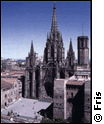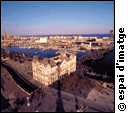:: Barcelona - Host City and General Information
Barcelona HostCity | Language | Climate and Clothing | Access to Barcelona | Transportation within the city | How to reach the Forum area | Currency Exchange | Restaurant and Tourist Information | Business opening hours, sales tax and tips | Safety recommendations | Power supply | Telephone calls | Visa information | Step-by-step access to ACL-04 site | "Accreditation Centre" opening hours
:: Barcelona - Host City
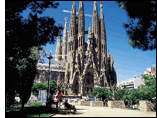 Located on the north-western Mediterranean coast, Barcelona is the second largest city in Spain and also the capital of Catalonia, today an autonomous region and one of the oldest national communities in Europe. Fabulous architecture, world class museums, history, culture, fine foods and wines, fashionable shopping - Barcelona has it all. About four million people live in and around the city. Catalans are known for their independent spirit, creativity, hard-working nature, peaceful and open-minded personality, and sense of humor.
Since its founding over two thousand years ago, Barcelona has been the traditional European gateway into Spain. Three historical periods in particular have moulded Barcelona's distinctive cityscape: the Roman period, extensive remains of which are present beneath the medieval town center; the Medieval age, during which the old Gothic-style town around the Cathedral was developed; and the late nineteenth century, when pioneering industrial activity resulted in economic prosperity and prompted the speedy construction of a planned new town.
Located on the north-western Mediterranean coast, Barcelona is the second largest city in Spain and also the capital of Catalonia, today an autonomous region and one of the oldest national communities in Europe. Fabulous architecture, world class museums, history, culture, fine foods and wines, fashionable shopping - Barcelona has it all. About four million people live in and around the city. Catalans are known for their independent spirit, creativity, hard-working nature, peaceful and open-minded personality, and sense of humor.
Since its founding over two thousand years ago, Barcelona has been the traditional European gateway into Spain. Three historical periods in particular have moulded Barcelona's distinctive cityscape: the Roman period, extensive remains of which are present beneath the medieval town center; the Medieval age, during which the old Gothic-style town around the Cathedral was developed; and the late nineteenth century, when pioneering industrial activity resulted in economic prosperity and prompted the speedy construction of a planned new town.
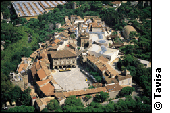 Since Spain remained neutral in both world wars, and the Spanish Civil War (1936-39) did not cause irreparable damage, Barcelona has survived well architecturally. The city is today at the center of an important industrial zone. Metal industry, textiles, machinery and car-making are at the top of the list. The harbour is among the most active in the Mediterranean. Trade far outweighs industry, both wholesale and retail, and in recent decades the services sector has become a huge contributor to Catalan economy.
Since Spain remained neutral in both world wars, and the Spanish Civil War (1936-39) did not cause irreparable damage, Barcelona has survived well architecturally. The city is today at the center of an important industrial zone. Metal industry, textiles, machinery and car-making are at the top of the list. The harbour is among the most active in the Mediterranean. Trade far outweighs industry, both wholesale and retail, and in recent decades the services sector has become a huge contributor to Catalan economy.
∑> back to index
In Barcelona, as in the rest of Catalonia, there are two official languages, Spanish and Catalan, both evolved directly from Latin but quite different from one another--Catalan
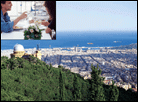 having closer ties to Provençal. In various dialectal forms Catalan is spoken by a total of some ten million people living, in addition to Catalonia, in nearby Valencia, the Balearic Islands, the south of France, and other neighbouring areas. Road signs and other informative text may sometimes be only in Catalan. In most tourist areas, you should have no trouble finding people who speak English.
having closer ties to Provençal. In various dialectal forms Catalan is spoken by a total of some ten million people living, in addition to Catalonia, in nearby Valencia, the Balearic Islands, the south of France, and other neighbouring areas. Road signs and other informative text may sometimes be only in Catalan. In most tourist areas, you should have no trouble finding people who speak English.∑> back to index
:: Climate and Clothing
 Barcelona is usually warm and humid in July. Average temperatures in July: 25º C / 78º F. There may be occasional showers at this time of the year. Light, comfortable clothing is recommended. Dress will be informal for most Congress-related activities.
Barcelona is usually warm and humid in July. Average temperatures in July: 25º C / 78º F. There may be occasional showers at this time of the year. Light, comfortable clothing is recommended. Dress will be informal for most Congress-related activities.
∑> back to index
By air: More than 80 European cities have direct flights to Barcelona, with a daily frequency in many cases. There are also flights from many cities of North and South America, Africa and Asia. The Barcelona-El Prat International Airport is not far from Barcelona. It is linked to the city center by rail (Sants and Catalunya Stations), every 30 minutes, and by bus, every 15 minutes, with several stops in the city. The airports at Girona-Costa Brava and Reus, both about 100 kms away from Barcelona, are served by several low-fare airlines. Convenient bus connections to Barcelona are available from both. By rail: International direct lines to Barcelona-Sants Station come from main European cities. There are also many trains from Madrid some of them 'sleepers'. By road: Motorway AP-17/7 from La Jonquera (at the French border) links up with the French motorway network. Motorway AP-7 to the west and south connects Barcelona with points in Spain. Motorway AP-2 connects motorway AP-7 with the southwest entrance to Barcelona: Diagonal Avenue. Taxi service: Taxi service is available 24 hours a day. There are taxi stands at the exit of the airport terminals and also outside Sants train station. Taxis in Barcelona are easily recognizable by their colors (yellow and black). They are equipped with official taximeters and fares are charged in euros. There is usually an extra charge for luggage loaded in the trunk/boot. A taxi from the airport costs approximately EUR 18,00-26,00 , depending on traffic.
∑> back to index :: Transportation within the city
Barcelona has an excellent public transportation system, served by a network of buses, the metropolitan subway and a large fleet of taxis. We recommend the use of public transportation to reach the conference venue (underground, bus or taxi) There are many subway (metro) lines for transportation within Barcelona, operating daily from 05:00 to 24:00h. Ten-trip cards (metro and bus), which are cheaper than individual tickets, are available at any metro station. Night buses operate separately from the city buses and do not accept the cards. Taxis are moderately priced. For more information, see the TMB (Transports Metropolitans de Barcelona) web site: www.tmb.net The nearest subway station to the Forum Convention Center (conference venue) is Maresme-Fůrum station, (yellow no. 4 line). The buses from the city centre are: 7, 36, 41, 43, and 141. Finally, a new tram from Nord Bus Station to Forum area will become available in the near future.
∑> back to index :: How to reach the Forum area
The Barcelona Interantional Convention Center (CCIB), where ACL-04 is to be held, is within the premises of the Forum 2004. The Forum has been built at one of the ends of Diagonal Avenue, the longest street in Barcelona, in a large area by the sea. The Forum area is in the north-eastern part of the city. In most Barcelona city maps this area appears in the bottom righthand side of the map. The Forum area is 20 minutes away from the city centre by subway, bus, or tram. The nearest subway station to the Forum is Maresme-FÚrum station (yellow line no.4). The buses from the city centre are: 7, 36, 41, 43, and 141. There is also a tramway that departs from GlÚries Square (TrambesÚs): line T-4, Stop: Forum. Useful information to get to the Forum is available here and also a map of the area.
∑> back to index :: Currency Exchange
The currency since 2001 is the euro (€ or EUR; EUR 1 = 100 cents 'cèntims'). Banknotes come in denominations of €5, 10, 20, 50, 100, 200, and 500 (the latter rare and hard to break except in banks) and the coins are 1, 2, 5, 10, 20, and 50 cents, €1 and €2. Except in small businesses, credit cards are widely accepted in almost every restaurant and shop in Barcelona. Money can be exchanged in banks, airport, major railway stations, and exchange offices displaying a "Cambio/Canvi" sign. Banks are open 9a.m. to 2p.m., Monday to Friday. An exchange office will be available at the Fira Palace Hotel during the Conference. You can also use cash-points (ATMs) to withdraw money, since most of them are connected to national and international networks.
∑> back to index :: Restaurant and Tourist Information
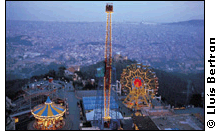 There will be ample information on restaurants at the conference registration desks. During your stay here, you should try Barcelona's cuisine, which is a blend of Mediterranean culinary traditions. Also, you should taste the splendid wines and cavas (sparkling wines) of the region.
The information desk will also offer information on cultural events as a service to all participants.
There will be ample information on restaurants at the conference registration desks. During your stay here, you should try Barcelona's cuisine, which is a blend of Mediterranean culinary traditions. Also, you should taste the splendid wines and cavas (sparkling wines) of the region.
The information desk will also offer information on cultural events as a service to all participants. ∑> back to index :: Business opening hours, sale taxes, and tips
In general, shops in Barcelona open in the morning from 9 or 10h to 13 or 14h and in the afternoon from 16 or 17h to 20 or 21h. Some shops do not close for lunch and
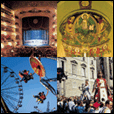 others (mainly in the center) do not close on Saturday afternoon. Sunday is a holiday. Nearly all museums open on Sunday (mornings) and close on Mondays.
Sales Tax or Value Added Tax (in Spanish and Catalan IVA) for general goods (16%) and hotels and restaurants (7%) is charged on goods and services in the European Union (EU), and only visitors resident outside the EU are entitled to an exemption (via reimbursement) whenever a single purchase exceeds Ä90.15 . A Tax-Free sticker is displayed in more than 700 establishments in the cityís main shopping areas, including the airport. Ask for details for reimbursement when you make your purchase.
Because the service charge is normally included in most bills, tipping is not compulsory, but it is customary to leave a small additional amount (generally some small change) when you are happy with the service. Tip taxis up to five percent of the total fare. Tip hotel porters for assistance with bags, and room service attendants for their assistance.
others (mainly in the center) do not close on Saturday afternoon. Sunday is a holiday. Nearly all museums open on Sunday (mornings) and close on Mondays.
Sales Tax or Value Added Tax (in Spanish and Catalan IVA) for general goods (16%) and hotels and restaurants (7%) is charged on goods and services in the European Union (EU), and only visitors resident outside the EU are entitled to an exemption (via reimbursement) whenever a single purchase exceeds Ä90.15 . A Tax-Free sticker is displayed in more than 700 establishments in the cityís main shopping areas, including the airport. Ask for details for reimbursement when you make your purchase.
Because the service charge is normally included in most bills, tipping is not compulsory, but it is customary to leave a small additional amount (generally some small change) when you are happy with the service. Tip taxis up to five percent of the total fare. Tip hotel porters for assistance with bags, and room service attendants for their assistance.∑> back to index :: Safety recommendations
Catalonia is a country with one of the lowest crime rates in Europe. Nevertheless, like in every big touristy city in the world, pay attention to crowded places and streets with lots of pedestrians: pickpockets and other petty thieves are quick and are known to use a variety of distracting techniques, although the use of violence is extremely rare. When in the street or marketplace, always carry bags and cameras across your chest and in front of you, and carry wallets in inside pockets, in handbags, or in zipped waist wallets. Do not carry more money than necessary, do not flash out your cash when making a payment. In case you have any problems, get in touch with the Police Service 24 h (091).
∑> back to index :: Power supply
220 V. Frequency 50 Hz. :: Telephone calls
Pay phones are available at the conference venue for local and long distance calls. Public phone booths are light blue or grey. They operate with coins or cards. For international calls dial 00, then dial the country and area codes.
∑> back to index :: Visa information
Citizens of following countries, with an ordinary passport, valid for a minimum of 3 months, who wish to stay in Spain for tourist or business purposes for up to 90 days DO NOT need a visa:
- Andorra, Argentina, Australia, Bolivia, Brasil, Brunei, Bulgaria, Canada,
Czech Republic, Chile, Cyprus, Costa Rica, Croatia, El Salvador, Eslovenia,
Estonia, Guatemala, Honduras, Hungary, Israel, Japůn, Latvia, Lithuania,
Malaysia, Malta, Mexico, Monaco, Nicaragua, New Zealand, Panama, Paraguay,
Poland, Republic of Korea, Rumania, San Marino, Santa Sede, Singapur,
Slovakia, Uruguay, USA, Venezuela, Hong Kong, Macao and countries of the
European Union.
-
A) IN ALL CASES
1. The application form filled and signed.
2. A photograph (passport size).
3. Passport, valid for a minimum of 90 days after the ending date of the visa.
4. Documentation corresponding to the socio-economical, personal or familiar characteristics of the applicant, which guarantees that he will return to his country of origin.
5. Documentation which proves the reason of the journey and the conditions of the stay.
6. Adequate maintenance means during the stay in Spain.
7. Accommodation disposal.
8. Medical coverage for the medical expenses in the stay and repatriation.
B) Any ADDITIONAL DOCUMENTATION that the Consulate considers appropriate depending on the aim of the stay.
This information can be found in the Spanish Ministry of Foreign Affairs.
∑> back to index
The Barcelona International Convention Centre (CCIB), where ACL-04 is held, is within the premises of Barcelona's Forum 2004. Forum 2004 officials have implemented specific security measures that affect access to ACL-04. When going to the Forum site for the first time, please allow some extra time, take your passport or relevant photo ID (the one you used for on-line registration), and follow these steps:
-
1. Go to the Forum's "Accreditation Centre" (please see map: building shown in red). Find the ACL-04 registration desk, where you will get your ACL-04 badge and your vouchers (proceedings and banquet). You can also register on site here. See below for opening hours
2. Still within the "Accreditation Centre", proceed to one of the "accreditation" queues (sorted alphabetically) to get your "accreditation", i.e. your Forum 2004 pass. Accompanying persons should obtain their one-day accreditations at the desk specially set up for this purpose. Forum tickets are bought at the entrance to the Forum grounds (next to building on the left).
3. Head to the CCIB (building on the right). Entrance to the Forum 2004 grounds is through the turnstiles next to it. Two security check points (with control of passes and X-ray inspection of bags) have to be crossed: the first one is at the Forum entrance turnstiles; the second one is at entrance to CCIB. For security reasons, only bags and luggage smaller than 50x40x20cms will be allowed through the entrance check points.
4. Collect your conference bag at the Conference Bag Pick-up Desk on the ground floor of CCIB, before going up to the main floor.
5. Go up to main floor. At the ACL-04 Desk you can exchange your proceedings voucher for the corresponding set of ACL-04 proceeding.
6. All conference rooms are on this floor.
∑> back to index
In order to avoid queuing it is strongly recommended that you pick your "accreditation" (the Forum pass) earlier in the day on July 21 or, if you plan to come on a later date, on the eve of the day your first plan to be at ACL-04. Opening hours are strictly enforced:
-
- July, 20: 9 am to 6 pm
- July, 21: 8 am to 7.30 pm
- July, 22: 8 am to 6 pm
- Other days: 9 am to 6 pm
